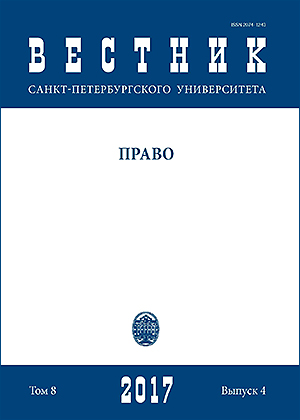Political-legal reasons behind the failed revolution in Egypt
DOI:
https://doi.org/10.21638/11701/spbu14.2017.402Abstract
The article deals with how the rule of law has been implemented in contemporary Egypt. What have been the changes for the last 3 years since A. F. el-Sisi has become president and why have they come about? Also author studied el-Sisi’s attitude to democracy and human rights trying to answer the following study questions: why did Egypt fail to take the path to democracy? What drawbacks have lead to the coup d’etat in 2013? What is el-Sisi’s opinion as to the rule of law and democracy? The Constitution 2014 in comparison with the Constitution 2012 is believed to be less liberal. The policy of authoritarianism stems from el-Sisi’s negative attitude to the concept of democracy. He believes that democracy is a secular concept, not very well accepted by the majority of the population of Middle Eastern countries, which should be Islam. The article is divided into several sections: the first sets out the reasons for the topple of the first democratically elected President Mohammed Mursi and the el-Sisi’s success for coming to power. In the second section I study his views on democracy. The third section presents the facts (mass death sentences, returning functionaries of Hosni Mubaraq into power and the justification for the corruption cases), which are signs of repression and authoritarianism. The judiciary has been weakened due to the persecution of the judges for their support of Mohammed Mursi. With a weak judiciary and growing discontent of the population with the economic and security situation, we can assume that the future path of authoritarianism could lead to destabilization. Refs 11.
Keywords:
parliament, judiciary, transitional justice, Constitutions of 2014 and 2012, human rights, democracy, combatting corruption
Downloads
References
Downloads
Published
How to Cite
Issue
Section
License
Articles of "Vestnik of Saint Petersburg University. Law" are open access distributed under the terms of the License Agreement with Saint Petersburg State University, which permits to the authors unrestricted distribution and self-archiving free of charge.






